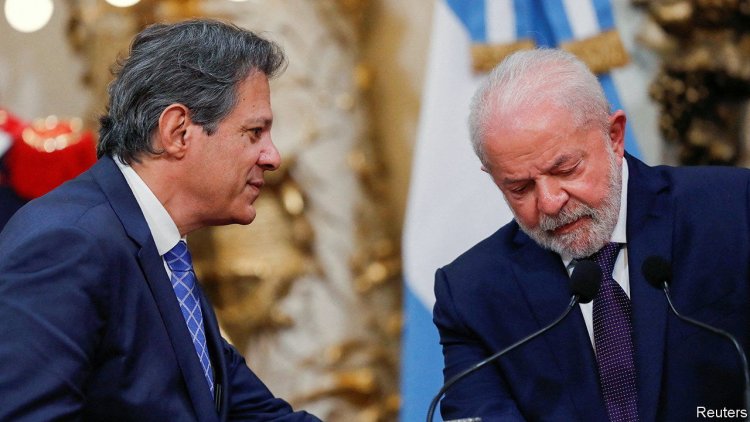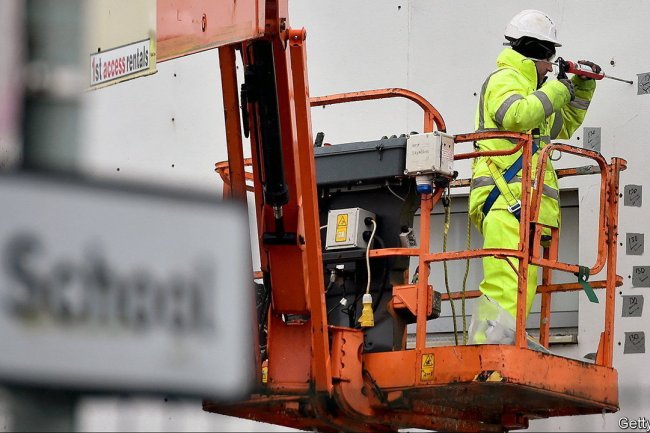Investors are increasingly optimistic about Brazil’s economy
image: ReutersWhen Luiz Inácio Lula da Silva was elected as Brazil’s president last year, investors shuddered. Many feared a return to the fiscal profligacy that characterised the previous government of his Workers’ Party, which ended in 2016 in a deep recession. Yet six months after he took office, markets are warming up to Lula’s administration. In a recent poll of 94 Brazilian fund managers and analysts, just 44% had an unfavourable view of the government, down from 90% in March. On July 26th Fitch, a ratings agency, upgraded Brazil’s long-term foreign-currency debt for the first time since it was downgraded in 2018.Brazil’s improving fortunes are partly the result of things outside Lula’s control. Russia’s invasion of Ukraine put exports from two of the world’s largest grain producers (Russia and Ukraine) at risk. China has lifted pandemic restrictions, driving up demand for foodstuffs. Both factors have made Brazilian grains more in demand. Soyabean exports alone could account for


When Luiz Inácio Lula da Silva was elected as Brazil’s president last year, investors shuddered. Many feared a return to the fiscal profligacy that characterised the previous government of his Workers’ Party, which ended in 2016 in a deep recession. Yet six months after he took office, markets are warming up to Lula’s administration. In a recent poll of 94 Brazilian fund managers and analysts, just 44% had an unfavourable view of the government, down from 90% in March. On July 26th Fitch, a ratings agency, upgraded Brazil’s long-term foreign-currency debt for the first time since it was downgraded in 2018.

Brazil’s improving fortunes are partly the result of things outside Lula’s control. Russia’s invasion of Ukraine put exports from two of the world’s largest grain producers (Russia and Ukraine) at risk. China has lifted pandemic restrictions, driving up demand for foodstuffs. Both factors have made Brazilian grains more in demand. Soyabean exports alone could account for a fifth of economic growth this year. This is increasing the country’s trade surplus, which is already hefty (see chart 1).
Similarly, rising tensions between the United States and China, and the possibility that the United States may lower interest rates next year, are causing many investors to look to emerging markets. Last year Brazil received over $91bn of foreign direct investment (FDI), making it the fifth-largest investment destination in the world. This was double the figure it received in 2021. The jump occurred despite the fact that global FDI inflows in 2022 fell 12% compared with 2021. “People are definitely looking at Brazil now in a way they haven’t for the past ten years,” says Robin Brooks, of the Institute of International Finance in Washington.
It also helps that Brazil’s central bank is independent. Lula has frequently thrown barbs at its president, Roberto Campos Neto. Lula blames Mr Neto for dampening growth by maintaining an interest rate of 13.75%, among the highest in the world. But the bank’s policies appear to have paid off. Annual inflation fell from 12% in April last year to 3.2% today (although it is predicted to end the year at about 5%). The bank is expected to lower rates this week. One factor which could help keep inflation low is that the real is appreciating against the dollar.
A heady mix
Several policies from Lula’s government have buoyed investors’ spirits, too. Many economists credit Fernando Haddad, the finance minister, for much of the optimism (pictured, above, with Lula). He is behind the two major reforms which could put Brazil on a more stable footing. On July 7th the lower house passed a constitutional amendment to push through a tax reform that has been three decades in the making. And later this year Congress is set to approve a new fiscal framework to stabilise public finances.
Consider the tax reform first. It is much needed: currently the federal government, all 27 states and over 5,000 municipalities set their own taxes. In 2019 the World Bank estimated that it takes companies 1,500 hours per year to comply with Brazilian tax law, compared with a global average of 233 hours. The tax reform will merge five taxes on goods and services into two value-added taxes, one federal and one local. It is expected to be approved later this year. Mr Neto has said that within the first year of its implementation, GDP could grow by 1.5%.
The fiscal framework will replace a rigid spending cap dating from 2016, which has consistently been broken, with a flexible rule. The new rule limits increases in primary spending by the federal government to 70% of the previous year’s revenue growth, aiming to achieve a balanced primary budget (ie, before interest costs) next year and a primary surplus from 2025 onwards. If the government does not reach its targets, spending growth will be tightened to only 50% of the previous year’s revenue growth and the government will not be allowed to increase wages of public workers, among other restrictions. Over time this should stabilise Brazil’s gross public debt, which currently stands at 74% of GDP, according to the central bank. (The central bank excludes debt it holds itself. On the IMF measure Brazil’s gross public debt is around 90% of GDP.)
Even those who are sceptical think that debt will eventually come under control. Felipe Salto of Warren, an investment firm, says that, earlier this year, “there was a lot of pessimism among our clients”. Now many see “a few years of bonanza ahead”.
Investors are also looking at Brazil’s potential to produce clean energy, and Lula’s ambitions to make the country a green power. This month the government is set to introduce a package of around 100 environmental initiatives, including a law to create a regulated market in carbon emissions and one to boost green industries. The government reckons the package will require hundreds of billions of dollars of mostly private investment. A free-trade deal could also soon be signed after more than two decades of negotiations between the European Union and Mercosur, a trade bloc composed of Brazil, Argentina, Paraguay and Uruguay (though protectionist instincts, in both Brazil and the EU, could yet sabotage this).
Yet optimism should be tempered. For a start, the success of the tax reform and fiscal framework are not guaranteed. Details of the tax reform have yet to be thrashed out. This means it is not yet clear what the new VAT rate will be, nor how many sectors will have a reduced rate or an exemption from it. The agribusiness lobby has pushed for the wording of the rule to include tax exemptions for food, which could include a large number of products.
The more other sectors get special treatment, the higher the overall standard rate will be, says Eduardo Fleury, a consultant who advised the government on the reform. The service sector, which will see its tax burden rise the most, is pushing back hardest. “We need a tax evolution, not a tax revolution,” says Guilherme Mercês of the National Confederation of Commerce, Services and Tourism.
Taxing times
It is also not certain that the government will get its finances in order. Instead of cutting spending or focusing on growth, the government hopes to reach a primary balance by increasing revenues by an extra $26bn next year (worth around 1.1% of GDP), according to Simone Tebet, the budget minister. Much of this will come from clamping down on tax evasion, reforming income tax and taxing online betting. Congress also recently voted to restore to the executive the ability to resolve deadlocked judgments on tax appeal cases. This right, lost in 2020, is worth $8bn a year in uncollected taxes, Ms Tebet estimates.
However, the government is unlikely to meet its targets, says Vilma Pinto of Brazil’s Independent Fiscal Institute (IFI). Because of the difficulty of recovering money lost to evasion and the time it takes to approve new taxes in Congress, the IFI estimates the government will be able to collect only $18bn next year. Ms Tebet confidently asserts that the administration would cut spending if it is not on track to reach a balanced budget next year. “This government is aware that there cannot be social welfare without fiscal responsibility,” she says. “Without fiscal responsibility inflation will explode, and that is the most perverse tax of all.”
Ms Tebet is a moderate at the top of government. But her boss is less keen on orthodoxy. Lula increased social spending in his first 100 days with an increase worth $24bn annually. He also recently introduced a subsidy which gave tax breaks to manufacturers of cars, trucks and buses. It is a one-off worth $300m for cheap vehicles, and is a sop to the middle class. On July 12th he proposed doing the same for white goods.

And history cautions against too much ebullience. Brazil has huge potential but has consistently punched under its weight. After growing for ten years during a commodities boom, real GDP contracted on average by 0.3% a year between 2014 and 2019. Productivity outside agriculture has not grown in three decades (see chart 2). Though growth has rebounded since the end of the pandemic in 2021, it has trailed far behind countries such as China or India. The global backdrop and Mr Haddad’s prowess are boosting investor optimism now. But it will take consistent good policy to buck Brazil’s long-term trend. ■
What's Your Reaction?

















